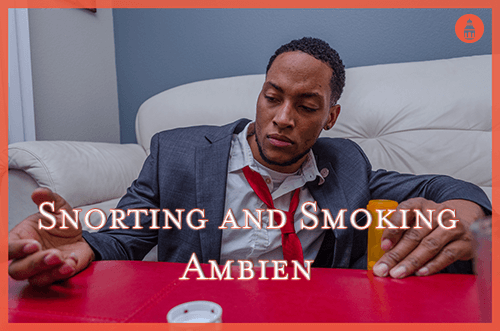Navigation
Ambien (zolpidem) is a sedative-hypnotic drug that is primarily prescribed to help people with insomnia initiate sleep. Ambien works by increasing the amount of the inhibitory neurotransmitter gamma-aminobutyric acid (GABA) in the central nervous system. This results in feelings of sedation and relaxation, a decrease in subjective feelings of stress or anxiety, and a slowing down of all bodily functions. Products containing the active ingredient zolpidem are classified as Schedule IV controlled substances by the United States Drug Enforcement Administration (DEA).
According to the yearly data released by the Substance Abuse and Mental Health Services Administration (SAMHSA), abuse of zolpidem products is relatively mild compared to abuse of similar prescription central nervous system depressant drugs, such as benzodiazepines. In 2016, it was estimated that approximately 11.5 million individuals used zolpidem products, and of these, approximately 1.05 million misused the drug at least once. There are no reliable records that report how many individuals snort or smoke Ambien; however, one can find numerous discussions online from individuals who have engaged in this practice.

The abuse of prescription drugs is a major issue in the United States, and individuals who abuse prescription drugs often use them in a way that is contrary to prescribed use of the drug. Ambien is typically used in pill or capsule form and taken orally. Abusers often attempt to increase the psychoactive effects medications by altering the manner by which the drug is taken. Two such practices associated with abuse of prescription medications are snorting or smoking these medications in an effort to increase their psychoactive effects. Either of these can be a potentially dangerous practice.
Snorting Ambien

A common method of abusing prescription medications is to grind the pills into a fine powder and then to snort that powder. In most cases, this means inhaling the drug through the nose, a method sometimes referred to as nasal insufflation.
When drugs are snorted, they bypass the digestive track and liver, and are not subject to what is known as first-pass metabolism. Instead, the drug goes directly into the bloodstream through the blood vessels in the nasal cavity and then it goes directly to the brain. Snorting drugs leads to intensified effects, including intensified dangerous side effects (see discussion on side effects below).
There are several significant dangers associated with snorting prescription drugs that are not meant to be snorted like Ambien. According to the book Topics in Pharmacology: Routes of Drug Administration, some of the specific dangers associated with snorting medications include:
- Significant irritation of the nasal mucosa
- Increased risk of perforating the nasal septum
- Development of sinusitis (a sinus infection)
- Loss of sense of smell
- Increased risk of serious side effects associated with the drug
- Increased risk for overdose
Smoking Ambien
There few references to individuals smoking Ambien in the research literature, and a small number of drug abusers discuss this practice online. This does not appear to be an effective way to use the drug, but if the zolpidem is vaporized and inhaled, it would reach the bloodstream even more quickly than it does when it is snorted.
Prescription medication pills also contain fillers and binders in addition to the actual drug. Smoking Ambien would result in an individual also inhaling these substances, and this can result in health problems, including issues with the respiratory system.
There appear to be two major ways that Ambien might be smoked.
- Ambien could be heated on tin foil. Attempting to inhale the drug in vapor form in this manner would most likely be inefficient.
- Ambien could be smoked with marijuana or tobacco. The deleterious effects of these drugs would also be mixed with the fillers and binders in the Ambien to result in a greater potential for a person to develop respiratory issues and cancer down the road if the practice is continued. The combined effects of Ambien and marijuana might result in an enhancement of the central nervous system depressant effects of either drug, leading to significantly increased feelings of lethargy, confusion, and cognitive issues, such as problems with judgment and reasoning.
The vapor produced by burning zolpidem could be extremely potent and would enter the bloodstream and brain incredibly quickly. This would result in significantly enhanced effects of the drug and the potential to enhance the side effects of the drug listed below. In addition, the psychoactive effects (the high) from the drug would be very intense and extremely brief. The person would experience a very brief “crash” once the psychoactive effects terminate.
Individuals who smoke drugs typically binge on drugs because the psychoactive effects of the drug are extremely intense and brief.
This can lead to an increased potential for overdose because even though the immediate psychoactive effects dissipate rapidly, the drug still remains in the person’s bloodstream to some extent and bingeing on the drug can cause levels of the drug in the person’s system to build up to potentially dangerous levels.
In addition, as mentioned above, all of the other ingredients would also be absorbed through the lungs, throat, and bloodstream. Because the act of smoking drugs bypasses the first-metabolism system, the risk for other toxic effects could be increased.
Call Now (619) 577-4483
Increased Risks Associated with Snorting and Smoking Drugs Like Ambien
As mentioned above, in addition to the increased psychoactive effects of the drug associated with either snorting or smoking Ambien, there is also a significantly increased risk that a person who uses Ambien in this matter will experience negative side effects from Ambien.
By definition, any individual who snorts or smokes Ambien is abusing the drug. Continued abuse of the drug can lead to a substance use disorder. By definition, being diagnosed with a substance use disorder means that the person has issues controlling their use of their substance of choice, is suffering from significant distress or functional impairment as a result of their drug use, and has a form of mental illness.
Individuals who abuse prescription medications by snorting or smoking them have higher rates of mortality due to drug abuse and overdose than individuals who abuse prescription medications orally. People with substance use disorders who snort or smoke prescription medications often combine potentially dangerous drugs, are often more difficult to treat when they get involved in treatment programs, have more complications in treatment, and have longer courses of complicated recovery with more relapses than individuals who abused medications orally.
It’s Never Too Late to Get Help
